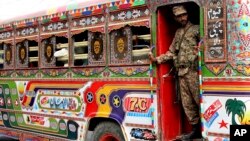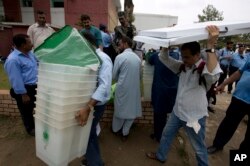Pakistan voters are going to the polls Wednesday amid tight security in the nation's hotly contested parliamentary elections.
The vote is being held after a contentious election campaign rife with allegations of pre-poll rigging and covert interference by the military establishment.
Nearly 106 million registered voters, out of the country’s 208 million population, are casting their ballots to elect members to the National Assembly and four provincial assemblies.
Voting started at 8 a.m. local time (0300GMT) and will continue through 6 p.m. local time (1300GMT).
The independent Election Commission of Pakistan (ECP) has set up more than 85,000 polling stations across the country where the military has deployed some 370,000 personnel to assist in peacefully conducting the voting process.
Militant attacks during the campaign killed nearly 180 people, including three candidates.
Of the 342 National Assembly seats, 272 are directly elected while the other 70 are reserved for women and minorities and are given to various political parties based on their percentage of winning seats.
While 96 political parties are competing in the elections, along with a number of independent candidates, the contest is set to come down to three mainstream parties: Pakistan Muslim League-Nawaz (PML-N), Pakistan Peoples Party (PPP) and Pakistan Tehreek-e-Insaf (PTI).
Opinion polls in the run-up to Wednesday’s vote have put PTI of cricket-star-turned politician Imran Khan slightly ahead of PML-N whose ex-leader and former prime minister, Nawaz Sharif, was recently jailed on corruption charges.
In third place is the PPP of 29-year old Bilawal Bhutto Zardari, the son of the slain two-time prime minister Benazir Bhutto.
The PML-N is the incumbent party that ruled not just the federal government for the last five years but also the country's most populous Punjab province.
Sharif and his supporters have accused the military of "pre-rigging" the election in Khan’s favor.
Army officials and Khan have strongly rejected the charges.
Wednesday's election will successfully transfer power from a democratically elected government to another for only the second time in Pakistan's 70-year-history. The military has launched repeated coups against civilian governments and seized power to run the country for several decades.





